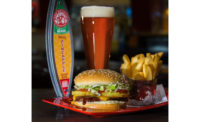2016 Wholesaler of the Year: Manhattan Beer Distributors
Beer distributor continues growing diverse portfolio of beers
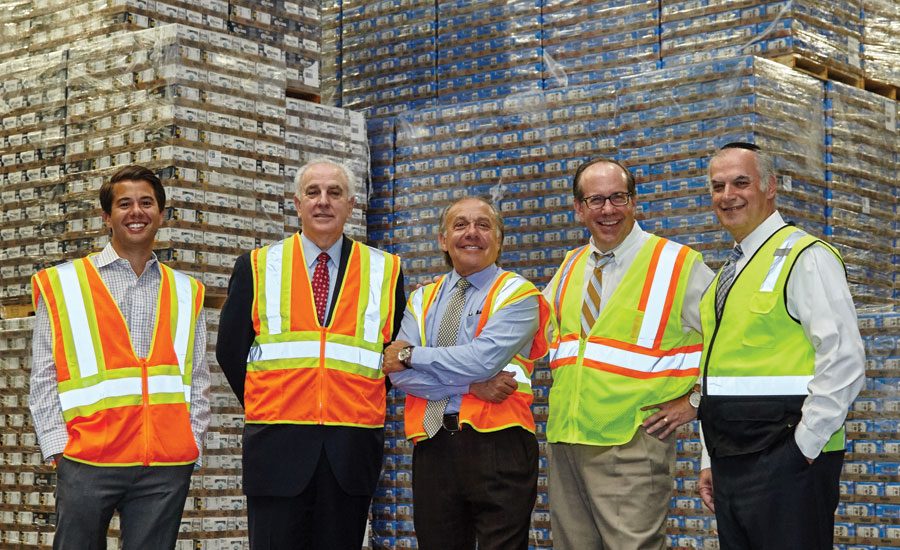
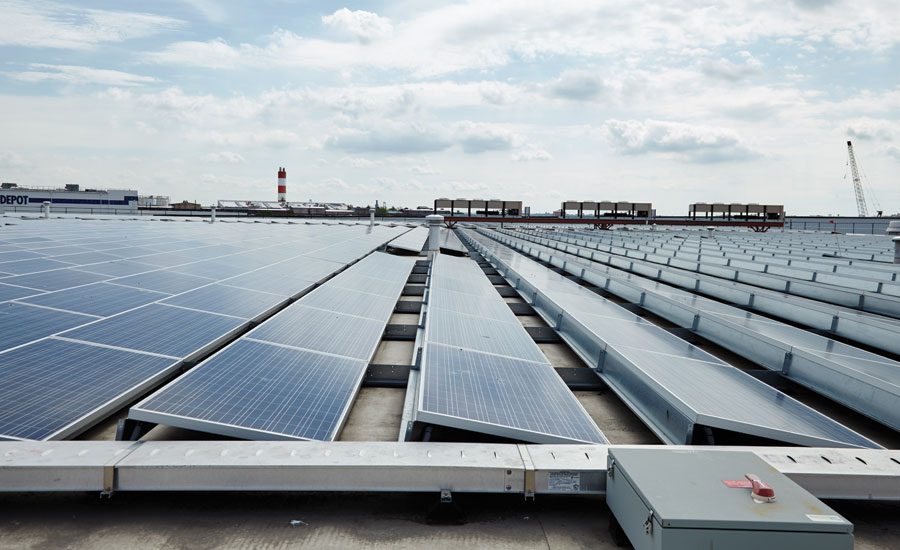
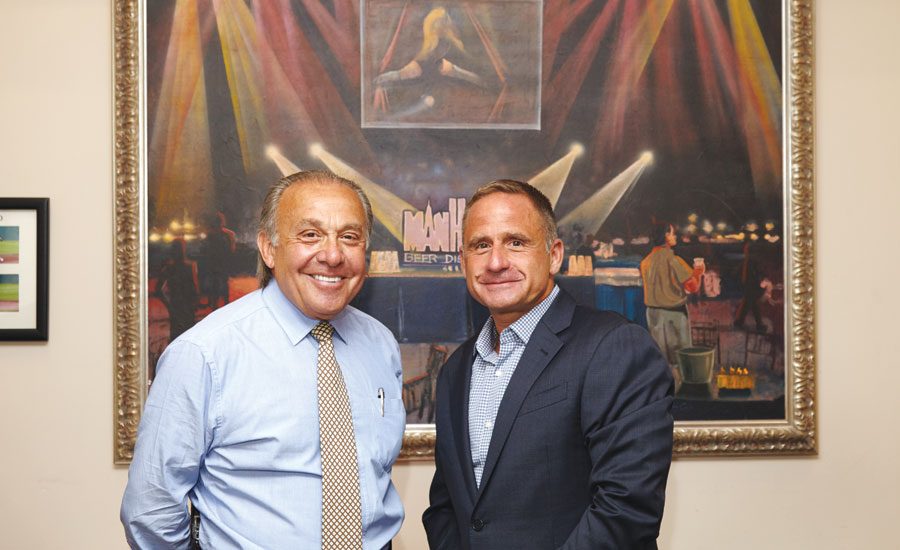
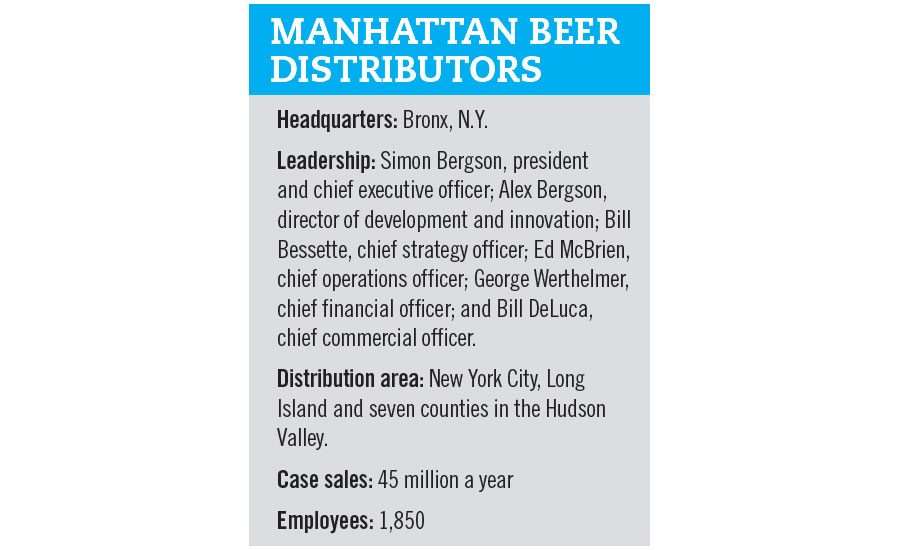




Originally operating out of a 4,000-square-foot warehouse and running a fleet of three delivery trucks, Bronx, N.Y.-based Manhattan Beer Distributors has become one of the largest beer distributors in the United States. The company continues to diversify its portfolio and grow each year, while maintaining its customer-centric focus within the bustling and competitive New York City community.
“Today, we have 1,850 employees and operate more than 400 trucks, providing service to 25,000 customers,” says Bill Bessette, chief strategy officer at Manhattan Beer.
In March 2008, Beverage Industry highlighted Manhattan Beer in a feature article titled “Manhattan Beer Distributors: Big city wholesaler keeps its focus small.” At that time, Manhattan Beer was delivering more than 28 million cases a year throughout the five boroughs of New York City and the surrounding areas. Today, less than a decade later, it delivers more than 45 million case-equivalents a year throughout New York City, Long Island and seven counties in the Hudson Valley, according to Bessette.
“[It’s] a very diverse area of more than 13 million people and a beer volume market of more than
100 million cases of total beer,” he explains.
In the 2008 article, Beverage Industry reported that the company represented 40 brands. Today, Bessette says it has approximately 350 brands within its ever-growing and -diversifying portfolio.
Due to its increasing sales and portfolio growth, the company now operates 24 hours a day, six days a week out of its five facilities, which are located in the Bronx, Brooklyn, Queens, Wyandanch, Long Island and Suffern, N.Y. “We have approximately 1.2 million square feet of warehousing and 275,000 square feet of cooler space,” Bessette says.
This continual growth, diversified portfolio and commitment to sustainability are why Beverage Industry has named Manhattan Beer Distributors its 2016 Wholesaler of the Year.
Bessette says the company’s success is a result of its “great people, great suppliers and brands, hard work, action orientation and a willingness to take risks, and from the beginning, a vision from Founder Simon Bergson. … We’ve been successful over the years because we’ve focused on being the best at sales and service. We will continue to find ways to get better at what we do, and we will continue to invest in marketplace opportunities.
“Manhattan Beer Distributors will continue its mission to provide the best possible service to our customers,” he continues. “We will utilize better technology and continue training our employees in our quest for exemplary service. As a distributor, we are on a continued mission for innovative ways to continue to participate in the Green Initiative and support the communities [that] we serve.”
Creating a diverse portfolio
The Manhattan Beer portfolio is 97 percent alcohol, but contains a range of non-alcohol beverages as well, Bessette says. Within its alcohol portfolio, the company offers a selection of beers, hard ciders, flavored malt beverages, wines and spirits.
With an overall goal to create a vast, diversified portfolio, Manhattan Beer continually takes on new brands. The distributor considers the supplier’s reputation, its business plan, committed resources and category trends before adding a new brand, Bessette explains.
“The newest additions to our portfolio are Ballast Point, Sweetwater and New Belgium, [all] of which offer highly respected portfolios and dynamic growth in the craft category,” Bessette says.
Both Ballast Point, a brand of Constellation Brands Inc., and New Belgium Brewing Co. are among the company’s top craft performers, along with the portfolios from The Boston Beer Co.; Brooklyn Brewery; Shiner, a brand of The Gambrinus Co.; Peak Organic Brewing Co.; Ithaca Beer Co.; Captain Lawrence Brewing Co.; Saranac, a brand of Matt Brewing Co.; Two Roads Brewing Co.; and North American Breweries, Bessette says. Among its craft options, Manhattan Beer also offers Not Your Father’s Root Beer, a brand of Small Town Brewery, along with many others.
“The number of [craft] brands and SKUs has added a lot of complexity and challenges in terms of warehousing and delivery,” he notes.
But craft beer accounts for only 10 percent of the company’s beer business. Bessette notes that Chicago-based MillerCoors’ Coors Light and Coors Banquet, alongside its Miller Lite and North American Breweries’ Genesee, are Manhattan Beer’s top performing domestics. The company’s domestic beer lineup accounts for approximately 40 percent of its beer portfolio, he adds.
However, the largest portion of the company’s beer portfolio comes from imported beer, which has a 50 percent share of the portfolio. Among the range of import brands the company offers, Bessette highlights brands from Constellation Brands, Heineken USA and Diageo USA. Its Top 10 import performers are Corona, Corona Light, Modelo Especial, Negra Modelo, Pacifico, Victoria, Heineken, Dos Equis, Tecate and Guinness.
Beyond its beer offerings, the distributor’s non-alcohol portfolio has presented Manhattan Beer with a strategic benefit, Bessette explains.
“We are a small non-alcohol distributor,” he says. “We look for products which are synergistic with our beer business. There are instances where a non-alcohol product, such as water, has helped us open accounts [that] had not carried one of our beers.”
Manhattan Beer’s non-alcohol portfolio includes Reed’s Inc.’s ginger beers and its Virgil’s craft sodas; Ithaca Beer Co.’s non-alcohol Ginger Beer and Root Beer; as well as Matt Brewing Co.’s Saranac craft sodas. The distributor also carries Red Bull North America products.
From Nestlé Water North America, Nestea RTD teas, select San Pellegrino products, Nestlé Pure Life, Perrier sparkling flavored and unflavored waters, and Resource water are within Manhattan Beer’s portfolio. Manhattan Beer’s bottled water offerings also include Acqua Panna, Iceland Spring Water, Llanllyr sparkling and still waters, and Voss still and sparkling waters.
Voss, San Pellegrino and Iceland Spring are the top players in the non-alcohol portfolio, according to Bessette.
Jack Belsito, group chief executive officer of Voss of Norway, highlights that Manhattan Beer was the company’s first U.S. distributor and helped to launch the premium bottled water. After a successful launch, he said that the relationship between the two companies has grown.
“We have a special bond with them,” he says. “That was the first contract [Voss] ever signed. … [Manhattan Beer] is exceptionally well-suited to our primary occasion, which is high-end dining. They have good people to sell and engage … especially for a beer distributor.”
With an ever-growing portfolio, ensuring the success of each brand is thoroughly planned. Manhattan Beer ensures that each product within its portfolio receives equal attention and support in the market. “[We ensure] meticulous planning with each of our suppliers to derive mutually agreed-to goals, a focused approach to applying the resources of both parties against those goals, and the use of our ‘Activity-Based selling’ program to ensure clear direction and incentive through the entire sales organization,” Bessette explains.
Striving for sustainability
As it grows, Manhattan Beer maintains a strong commitment to the communities and environments in which it operates. The company has instituted a series of initiatives and continually strives to be more eco-conscious and sustainable in its operations.
“All companies should feel a responsibility to the environment and the communities in which they do business,” Bessette says. “… Our [compressed natural gas] (CNG) trucks and solar power specifically benefit the local community.”
With a delivery fleet consisting of more than 350 vehicles, including tractor-trailers, side-loaders and box trucks, that run 1,500 routes on an average week, the company recognizes the impact that emissions can have on the environment, and it has begun to shift its fleet to more sustainable fuel options. “We are moving toward 100 percent use of CNG,” Bessette explains. “We were one of the first companies in the United States to use CNG in heavy-duty delivery vehicles. The Bronx, where our headquarters is located, has one of the highest rates of asthma in the country, and the move to CNG helped reduce air pollution.”
According to the “Manhattan Beer Green Initiatives” document, the company converted its medium-duty delivery vehicles to CNG in 2001. Since then, it has continued to add CNG vehicles to the fleet and now runs 100 CNG trucks on its routes.
In 2013, it began an initiative to generate electricity via solar panels, and by the end of 2016, the company plans to have approximately 500,000 square feet of solar panels generating
3 million mega-watts of power, the Green Initiatives document states.
Additionally, the document indicates that because the company receives product on 6,000 rail cars a year, it was able to eliminate 18,000 tractor-trailer deliveries, which reduces pollution while also reducing highway congestion.
Also, the company converted its Bronx headquarters to LED lighting and has plans to do so in its remaining facilities. Other initiatives include a state-of-the-art heating/cooling system at its Bronx facility, the use of waterless urinals at the Bronx facility and an extensive recycling program for aluminum, glass and cardboard.
“[Manhattan Beer Distributors] recycles over 100,000 tons of glass; 15,000 tons of aluminum; and 50,000 tons of cardboard annually,” the Green Initiatives document states.
The company’s executives also are involved in the beverage community. “We are members of The National Beer Wholesalers’ Association, The New York State Beer Wholesalers’ Association and the National Wine & Spirits Association,” Bessette says. “Simon Bergson has served on the board of both beer associations, and, along with being a board member, I am the in-coming chairman of the New York State Beer Association.”
Reaching for customer satisfaction
Regardless of its size, Manhattan Beer prides itself on providing individualized customer service by closely working with its customers and suppliers. Additionally, its marketing department works with suppliers to evaluate marketing materials for relevance in the marketplace and compliance with New York State regulations, Bessette explains. “They [also] work with suppliers to both ensure execution and evaluate results of each program.
“Each program is important to the supplier, so we work hard to plan appropriately and ensure that the right amount of focus is applied to each,” he continues.
On the other end of the spectrum, the company’s sales team totals more than 500 individuals who work throughout the New York metropolitan market. “We operate in a very diverse market, so each of our delivery facilities has a sales force headed by a general sales manager,” Bessette explains. “We are aligned against the major channels as well as geographically, depending on the nature of the marketplace. We have a group that is focused on beverage centers, a group that focuses on craft and wine and spirits, and a group that focuses on chain headquarters calls and category management.”
To help aid its 25,000 customers, the company has embraced the benefits of technology throughout its operations. “Each of our sales people utilizes a Dell Venue tablet, which provides comprehensive account information and transmits their orders electronically,” Bessette says.
All Manhattan Beer drivers are outfitted with handheld devices and printers, allowing transactions to be completed on-site, he adds. “It improves accuracy and provides a better level of service to our customer.”
Within its warehouses, the company has embraced the benefits that technology and automation can offer, especially considering its inventory capacity of 5 million cases. “We employ warehouse management systems from Rutherford, as well as a voice-picking system from Rutherford,” Bessette explains. “With the number of SKUs and complexity of our business, it is critical to use technology to help manage all aspects of shipping, receiving and inventory.”
As it grows, Manhattan Beer also recognizes that it must re-evaluate, expand or otherwise change and innovate to keep up with its growth and the trends of the market.
“Our warehousing and delivery approach is currently under evaluation by a third-party expert,” Bessette explains. “Upon conclusion, we will formulate a strategy to address future needs; however, construction in New York City is highly unlikely due to lack of land and cost of construction. For 38 years, we have retrofitted facilities that we are fortunate enough to first find and then acquire.”
He notes space constraints are to be expected when operating in the major metropolitan New York City market. Although the area provides a vast amount of potential accounts, traffic congestion and the cost of doing business can be challenging, Bessette adds. For example, the company paid $2.3 million for parking violations last year, he says.
However, by continually building an experienced, customer-centric team, the company has been able run effectively and efficiently despite its challenges. In fact, last year, it added Edward McBrien as chief operating officer. McBrien previously was president of sales and distributor operations for MillerCoors, Chicago, he says.
“Since making the move, I’ve found the entre-preneurial nature of the distributor tier is energizing and gratifying,” McBrien says. “We’ve got a world-class team, and [I’m] really proud to be a part of it.”
Looking for a reprint of this article?
From high-res PDFs to custom plaques, order your copy today!
 Read other Wholesaler of the Year articles
Read other Wholesaler of the Year articles




